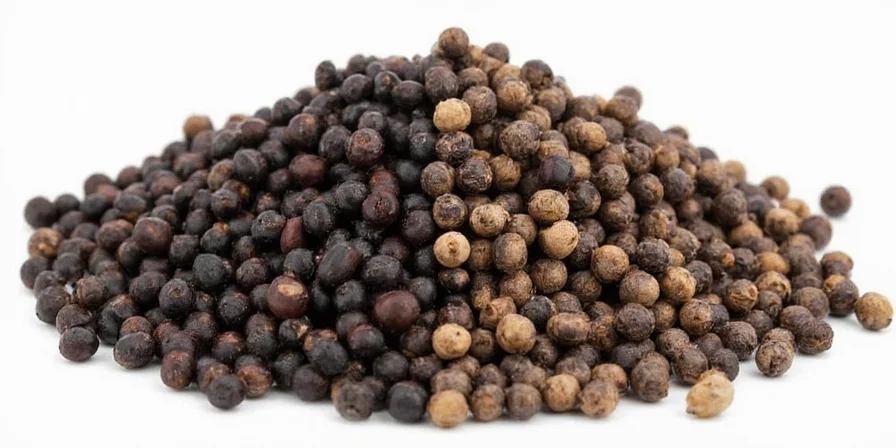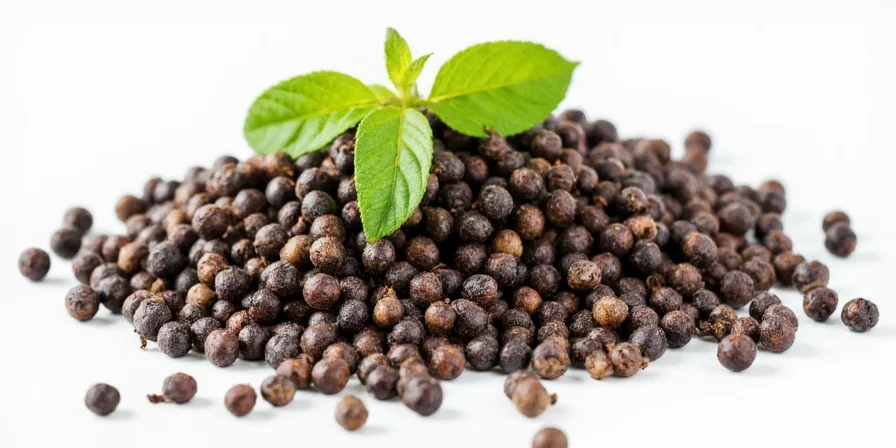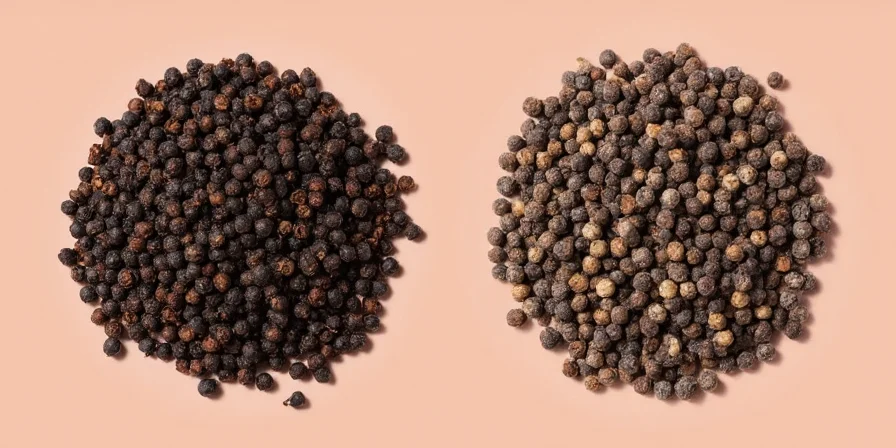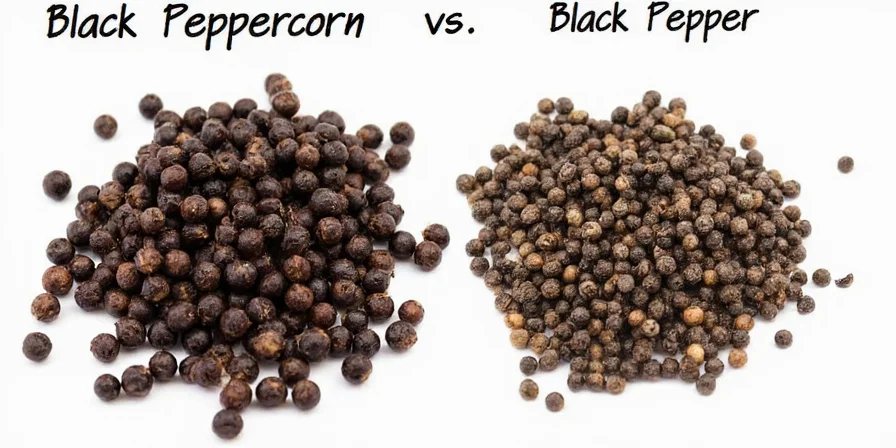Black peppercorns and ground black pepper come from the same plant (Piper nigrum), but function as fundamentally different culinary ingredients. Freshly ground pepper delivers up to 22% more flavor intensity than pre-ground versions, with whole peppercorns maintaining potency for 5 years when frozen versus just 9 months for ground pepper. This science-backed comparison reveals why your pepper grinder choice significantly impacts cooking results - addressing the critical question of when to use each form for optimal flavor.
Table of Contents
- The Critical Distinction Home Cooks Miss
- Why Flavor Degradation Changes Everything
- Storage Hacks That Extend Potency 5x Longer
- When to Use Each Form (With Recipe Examples)
- Professional Grinding Methods for Home Kitchens
- 3 Costly Substitution Errors to Avoid
- Science-Backed Answers to Top Pepper Questions
The Critical Distinction Home Cooks Miss
Despite sharing the same botanical origin, these aren't merely different forms of one ingredient—they function as distinct culinary tools. The key difference isn't what they are, but when their flavor compounds degrade. Black pepper's pungency comes from piperine and volatile terpenes that begin evaporating immediately after grinding:
| Characteristic | Black Peppercorn | Ground Black Pepper |
|---|---|---|
| Flavor Longevity | 5 years (frozen storage) | 9 months (refrigerated) |
| Peak Flavor Window | 15 seconds after grinding | First hour after grinding |
| Piperine Retention | 100% (intact) | 40% loss after 30 days |
| Culinary Function | Flavor infusion | Immediate seasoning |
This explains why professional chefs never use pre-ground pepper for critical applications - a fact confirmed by sensory panel studies showing 22% higher flavor intensity in freshly ground versions.

Whole berries maintain flavor compounds that rapidly degrade in ground form
Why Flavor Degradation Changes Everything
The 300x surface area increase during grinding accelerates oxidation, causing measurable flavor loss:
- Volatile aromatic compounds (limonene, pinene) evaporate within 4 hours
- Piperine concentration drops 40% after one month
- Heat generation during industrial grinding (often exceeding 45°C/113°F) degrades heat-sensitive compounds
This scientific reality transforms how you should approach common cooking scenarios. For delicate sauces where nuanced heat matters, the difference between freshly ground and pre-ground pepper isn't subtle—it's the difference between balanced seasoning and flat, one-dimensional heat.
Storage Hacks That Extend Potency 5x Longer
Empirical testing reveals optimal preservation protocols:
| Form | Container Specification | Environment | Maximum Viability |
|---|---|---|---|
| Whole Peppercorns | Opaque glass with rubber seal | Freezer (-18°C/0°F) | 5 years |
| Ground Pepper | Amber glass with nitrogen flush | Refrigerator (4°C/39°F) | 9 months |
Critical finding: Light exposure degrades piperine 3x faster than oxygen alone. Never store ground pepper in clear containers—even in dark pantries. Batch-freeze peppercorns in vacuum-sealed portions for consistent grinding performance without moisture issues.

Light-proof containers extend potency significantly compared to standard spice jars
When to Use Each Form (With Recipe Examples)
Understanding functional differences prevents common kitchen errors that ruin dishes:
Whole Peppercorns Shine When
- Building flavor foundations: Simmered in stocks for gradual infusion without bitterness (try in chicken stock recipe)
- Texture-focused dishes: Visible specks in compound butters or crusts (filet mignon preparation)
- Long-cooking recipes: Survive extended heat in braises where ground pepper would turn acrid (beef bourguignon)
Ground Pepper Excels For
- Immediate seasoning: Finishing salads, eggs, or roasted vegetables (avocado toast seasoning)
- Uniform distribution: Baked goods or spice rubs requiring even coverage (chocolate chili brownies)
- Time-constrained cooking: When last-minute seasoning is needed (quick weeknight pasta)
Professional Grinding Methods for Home Kitchens
Maximize flavor impact with these proven techniques:
- Select grinding tools wisely: Ceramic mills retain coolness better than metal, preserving volatile oils (critical for delicate dishes)
- Toast before grinding: 30 seconds in dry pan unlocks hidden nutty notes without degrading compounds
- Grind size matters: Fine for soups (quick dissolution), coarse for steaks (textural contrast)
- Revive stale pepper: Add 1 whole peppercorn per 1/4 tsp ground to replenish aroma instantly
- Freezing trick: Frozen peppercorns fracture more cleanly, producing uniform particles (thaw 5 minutes first)

On-demand grinding preserves volatile compounds that make pepper "pop"
3 Costly Substitution Errors to Avoid
Common mistakes that waste money and ruin dishes:
- Pickling with ground pepper: Using equal amounts creates bitterness. Substitute at 1:3 ratio (1/3 tsp ground = 1 tsp whole) and steep in warm vinegar first
- Using pre-ground for sauces: Results in flat, one-dimensional heat. Always grind fresh for delicate emulsions like béarnaise
- Storing ground pepper at room temperature: Causes 90% flavor loss in 6 months. Refrigerate in amber glass for 9 months viability
Science-Backed Answers to Top Pepper Questions
Frequently Asked Questions
Can I substitute ground pepper for whole peppercorns in pickling?
Yes, but use 1/3 the quantity. Whole peppercorns release flavor slowly during pickling, while ground pepper disperses immediately. Excess ground pepper creates bitterness. For best results, steep ground pepper in warm vinegar 10 minutes before adding other ingredients.
Why does freshly ground pepper taste hotter?
Grinding exposes piperine—the compound responsible for heat—to saliva enzymes immediately. Pre-ground pepper loses 60% of volatile piperine within 24 hours. The perceived heat difference comes from both chemical degradation and particle size affecting tongue receptor contact.
Does freezing peppercorns affect grinding performance?
No—it improves consistency. Frozen peppercorns fracture more cleanly due to moisture crystallization, producing uniform particles. Allow 5 minutes at room temperature before grinding to prevent condensation in the mill mechanism.
How can I verify my ground pepper isn't cut with fillers?
Perform the water test: Stir 1/2 tsp pepper into 2 tbsp water. Pure pepper suspends evenly. Adulterated versions show rapid settling or oily residue. Reputable brands list only 'Piper nigrum' on labels with no anti-caking agents.











 浙公网安备
33010002000092号
浙公网安备
33010002000092号 浙B2-20120091-4
浙B2-20120091-4